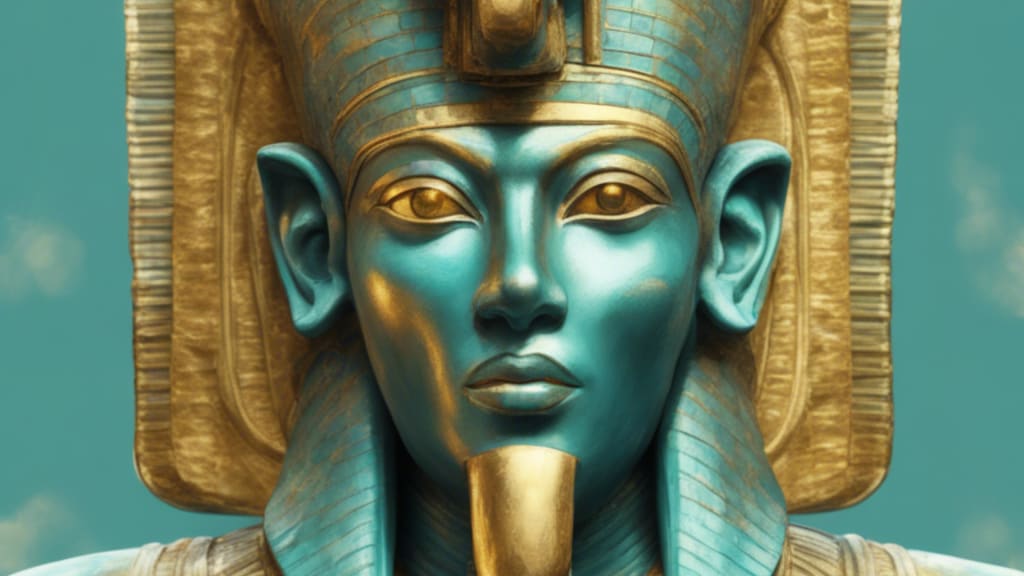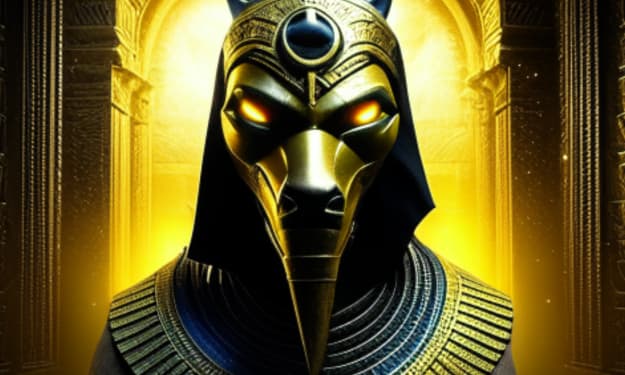The Divine Legacy of Osiris: Guardian of the Afterlife
In the realm of ancient Egyptian mythology, few gods hold as significant a role as Osiris

In the ancient land of Egypt, amidst the golden sands and mighty pyramids, there existed a god of unparalleled significance tha is Osiris, the beloved deity of life, death, and resurrection. His story, woven through the tapestry of Egyptian mythology, captivated the hearts and minds of ancient Egyptians for millennia. (I Love this ancient Knowlodge)
Osiris was not merely a god; he was a king, a judge, and a symbol of cosmic order. Born to the sky goddess Nut and the earth god Geb, Osiris emerged into the world as a divine ruler destined to bring prosperity and enlightenment to his people. As he ascended to the throne of Egypt, Osiris embodied the ideals of wisdom, justice, and compassion, earning the adoration of mortals and immortals alike. (He was a fair governor)
Yet, Osiris's reign was not without challenges. His jealous brother Set, consumed by envy and ambition, plotted against him with treachery and deceit. In a tragic turn of events, Set orchestrated Osiris's demise, casting his body into the depths of the Nile and shattering the peace of the kingdom. (Everyone as brother like that lol)
However, the story of Osiris did not end with his death. Guided by the unwavering devotion of his beloved wife Isis, the goddess of magic and resurrection, Osiris experienced a miraculous rebirth. Through her powerful magic and unwavering love, Isis pieced together Osiris's fragmented body, restoring him to life and ensuring his eternal presence among the gods. (She Was a good Wife)
Embraced as the arbiter of justice in the afterlife, Osiris assumed the role of judge in the Hall of Ma'at, where souls were weighed against the feather of truth. With impartiality and wisdom, Osiris presided over the fate of the deceased, granting eternal reward to the righteous and eternal punishment to the wicked. (Like i said he was a fair god)
Osiris's influence extended far beyond the realm of the divine. He was revered as the patron of agriculture and fertility, ensuring the fertility of the land and the prosperity of the people. His annual death and resurrection were celebrated in grand festivals and rituals, symbolizing the cyclical nature of life, death, and rebirth.
Through the enduring legacy of Osiris, the ancient Egyptians found solace in the face of mortality and hope in the promise of eternal life. His story transcended time and space, inspiring awe and reverence in the hearts of all who heard it, and cementing his place as one of the most revered gods of ancient Egypt. (I Love Egyptian Storys and you)
Furthermore, he was considered the first pharaoh and had a series of elements that related him to nobility, such as the atef, a type of crown worn by pharaohs. The history of Ancient Egypt is fascinating and full of mysteries. The pharaoh, a central figure in this civilization, was more than a ruler; he was seen as a god on Earth, responsible for maintaining cosmic order and the well-being of his people.
The atef, mentioned above, was not just a crown; it was a symbol of the pharaoh's divine power and his connection with Osiris, the god of the afterlife and resurrection. This crown consisted of a solar disk flanked by two ostrich feathers and often decorated with serpents, representing sovereignty and divine protection.
But being a pharaoh went far beyond wearing an impressive crown. It required ruling vast territories, managing scarce resources like the Nile - the source of life for the entire civilization - and leading in times of war and peace. Moreover, the pharaoh had to perform complex religious rituals to honor the gods and ensure Egypt's prosperity.
The life of Egyptian nobility was also full of responsibilities and privileges. They assisted in administering the kingdom, served as priests in temples, and enjoyed a luxurious life compared to the common people. Their tombs, richly decorated with hieroglyphs and treasures, are silent witnesses to their importance in society.
Reflecting on these aspects helps us better understand not only the history of Ancient Egypt but also the complexities of power and leadership in any era or culture. (They were thinkers)
Hope you enjoy reading it, like i enjoyed writing to you all!
Kind Regards
All the Best
Egypt Chronicles






Comments (1)
Your intriguing exploration of Osiris mythology sheds light on the deity's significant effect on ancient Egyptian civilization, merging themes of life, death, and the promise of resurrection in a timeless story.